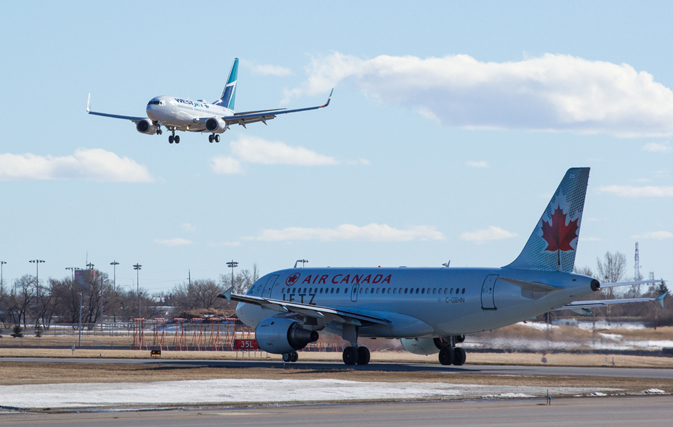OTTAWA — Airlines won’t be allowed to bump passengers from a flight against their will under a new passenger bill of rights introduced by Transportation Minister Marc Garneau.
That change is part of a package of amendments to the Canada Transportation Act which also introduces new foreign ownership limits for airlines, requires railways to install voice and video recorders in locomotives and improves transparency and efficiency in the freight rail industry.
Garneau promised the bill of rights last month in the wake of widespread alarm after a United Airlines passenger was seriously injured when he was dragged from a plane in Chicago.
The minister earlier wrote to all airlines operating in Canada to say such an incident is not to happen here, but he says the new legislation spells it out clearly: people who are legitimate passengers can’t be denied boarding or removed from the plane against their will.
“We have all heard recent news reports of shoddy treatment of air passengers,” Garneau said at a news conference. “Such incidents will not be tolerated in Canada. When Canadians buy an airline ticket, they expect the airline to keep its part of the deal.”
He said there will be minimum levels of compensation for people who voluntarily agree to be bumped from a flight and if airlines can’t get a volunteer, they will have to decide if they want to up the ante to persuade someone to get off.
There will also have to be compensation for lost or damaged bags. Airlines will have to spell out what they will do for passengers who are delayed due to situations within an airline’s control, as well as how they will ensure passengers complete their travel if they are delayed due to weather.
The bill also will prevent airlines from charging parents to sit next to their children if the kids are under the age of 14, and will have to create new standards for transporting musical instruments.
The specifics of what will be compensated and with how much won’t be determined until regulations are introduced after the legislation is passed. Those will be worked out by the Canadian Transportation Agency.
Garneau said he is considering what further penalties would apply if airlines do not live up to the new requirements, but there are none contained in the legislation.
He wants the new legislation in place in 2018.
There are already some requirements in place for airlines to compensate passengers who are bumped or whose luggage gets lost but each airline can set its own rules and compensation packages.
“There are rules at the moment but they’re rather opaque to the average flyer,” said Garneau.
The legislation also increases the cap on foreign ownership of airlines to 49% from 25%, and introduces new allowances for airlines to enter into joint ventures with international carriers to do things such as share marketing and scheduling.
Both Air Canada and WestJet issued statements following the announcement of the new legislation.
“Air Canada welcomes the government’s desire to establish air passenger rights that are clear, consistent, transparent and fair for passengers and air carriers industry-wide. We believe it is in the interest of all parties to create a more predictable and fair system that applies to all airlines operating in Canada, which is not currently the case. Air Canada looks forward to participating in the consultation process relating to the new regulations over the coming months,” said the airline.
The increase of foreign ownership limits to 49% (from 25%) should provide improved access to international investors and global capital markets for Air Canada. The airline added that the proposed amendments to the legislative provisions governing joint ventures in the airline industry “should facilitate the opening up of new markets by Air Canada and its joint venture partners and accelerate projects that are currently under consideration”.
Air Canada said it had hoped that the government would have addressed shortfalls in CATSA (Canadian Air Transport Security Authority) funding and other shortcomings in a more comprehensive fashion so as to improve the overall air traveller experience.
“In addition, we continue to encourage the government to address aviation industry infrastructure, rates, taxes and charges.”
Meanwhile Mike McNaney, WestJet Vice-President, Industry, Corporate and Airport Affairs, said WestJet also welcomes the legislation and is committed to working with the CTA, the Minister, parliamentarians and government agencies in the months to come.
“We also encourage the government to address all aspects of the travel experience, particularly those beyond the control of airlines such as lengthy wait times for passenger screening and customs,” McNaney added. “We believe that any effort to improve the guest’s travel experience must take into account all aspects of that experience, in particular those services provided by the federal government.”
As the federal government moves forward with policy changes to improve commercial aviation, McNaney said WestJet has been investing heavily in providing consumers with ever-expanding choice and options: “consistent with our vision to enrich the lives of everyone in WestJet’s world, the airline plans to launch an ultra-low-cost carrier by the end of 2017 and has committed to the purchase of 10 Boeing 787 Dreamliners, which will begin arriving in 2019, with an option for 10 more.”
WestJet’s latest marketing campaign under the Owners Care umbrella, specifically focuses on WestJet’s unique position as one of the few airlines globally that does not commercially overbook its flights.

